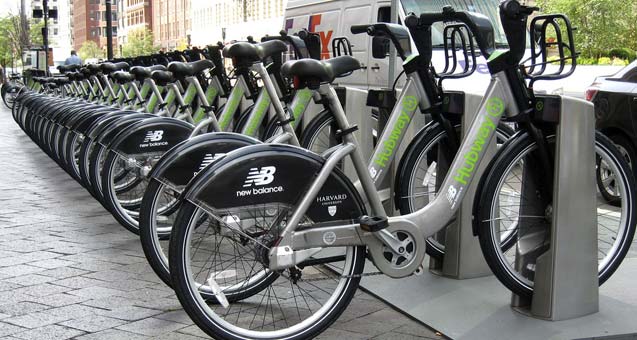
Support justice-driven, accurate and transparent news — make a quick donation to Truthout today!
As more and more cities add bike share programs, it’s important that we talk about safety, and for a lot of people that discussion comes down to helmets.
Rentals through bike share don’t usually offer bike helmets along with the bike — although some do, like Melbourne’s and the bike helmet vending machine in Boston – and that has made some people skeptical of how safe bike share programs can be.
Some were shocked to read a new study that looked at cities with bike share programs and the correlation to brain injury. The study reported that in the cities with bike share programs, the proportion of bicycle-related head injuries that led to admission to a trauma center increased by 14 percent.
That sounds like an alarming number, but in response, Kay Teschke, a professor who studies cycling in cities at the University of British Columbia, took a look at the report and the data. In going through the study, she found that actually, in cities with bike share, the total number of accidents actually decreased, with total injuries decreased about 28 percent, and total head injuries decreased about 14 percent.
As the Atlantic’s City Lab reported:
…now what do we know? Well, first, that head injuries did increase as a proportion of total injuries in bike-share cities after program implementation, and second, that aggregate annual injuries declined in bike-share cities even as they remained about the same in non-bike-share cities. The AJPH paper failed to mention the second and arguably more crucial point. So rather than conclude that bike-share systems might be increasing rider safety, the researchers argued that bike-share systems might improve head safety by offering helmets. In that sense, they seemed to miss the forest for the trees.
It’s important to remember that the data showed a correlation, not a causal link, between bike share cities and head injuries, and until more research is done, we can only speculate as to the reason why. It’s plausible to argue that as more people ride, these cities are becoming more accustomed to cyclists as well as the city putting in better infrastructure to support these bike share programs and promote the safety of its users.
Compare that to a study in the British Medical Journal earlier this year that showed that the rate of injury for bike share users was lower than cyclists in general, potentially attributed to things like designated bike paths and heavier bicycles.
But let’s get back to helmets. When it comes to helmets, and whether or not there should be laws requiring helmets with bike share programs, evidence for whether or not helmets reduce injuries is mixed. It’s hard to measure injury rates due to helmet legislation, but ultimately it comes down to this: whether or not a helmet reduces your risk for injury, if you do get in an accident, you are happy to be wearing one.
A bike helmet is a “last line of defense” as Washington Post writer Christie Aschwanden put it in a column last year, which means that we shouldn’t use a bike helmet as a replacement for all the other safety precautions we should take while cycling. I personally use bike share and carry my bike helmet with me, but I know that it’s not an excuse for being a bad rider, and in a bad crash, it may not save me. But I would rather wear it in the event that it does.
Discussing the safety of bike share programs is important, especially as bike share programs grow. We need smart programs and infrastructure in place that support safe cycling. More cities putting in more programs that encourage people to ride a bicycle is a good thing.
Maybe one day we’ll live in a world where all major cities have an extensive network of protected bike lanes, and cyclists won’t always feel like they’re pawns in a game of car traffic, but until then, let’s keep the helmets on.
Media that fights fascism
Truthout is funded almost entirely by readers — that’s why we can speak truth to power and cut against the mainstream narrative. But independent journalists at Truthout face mounting political repression under Trump.
We rely on your support to survive McCarthyist censorship. Please make a tax-deductible one-time or monthly donation.